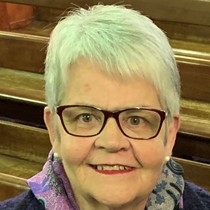Interview with ACSL Board Member Sr Kath Tierney RSM AO
Melbourne-based Sr Kath Tierney brings decades of experience in child protection, as well as significant experience in safeguarding and complaints management to her role as a Board Director with ACSL. In addition to her professional expertise, Sr Kath is a Sister of Mercy, who has served in leadership roles within her own congregation and as well as a range of roles throughout the Church in Australia, including a current appointment serving as Deputy Chair of Catholic Social Services Australia.
What has drawn you to this role on the ACSL Board?
I am interested in governance work but I also have a deep desire for the whole of the Church to

work together in regards to safeguarding. I want to ensure that safeguarding has a very high profile within the Church, and to assist Church Authorities and agencies to meet their obligations regarding safeguarding.
What type of work background do you come from?
I am a Sister of Mercy and in my ministry I’ve spent 19 years working in child welfare, with an emphasis on child protection and out of home care. Following roles in welfare, I was elected to the leadership of the Melbourne congregation of the Sisters of Mercy where I served two terms (12 years). Since that time, I’ve worked in the area of complaints management and professional standards in the Catholic Archdiocese of Melbourne (until recently), and prior to that I was working in a similar role for a short time in Catholic Education Melbourne.
How has that prior experience shaped how you approach working in this critical role for the Church in Australia?
In my time in child welfare I saw the best and worst of people’s interactions with children and these experiences shaped my response to many situations. During this time, I had this desire to find solutions for what seemed like impossible situations in some ways to effect changes in children’s lives. I’m very passionate about the fact that it is a fundamental right for each child, and each person for that matter, to be safe, to be cared for and to know that they are loved.
Where else are you currently working/serving on Boards?
I’m a board director for Catholic Social Services Australia and also do committee work across religious congregations, particularly in safeguarding and professional standards committees. I’ve just recently taken up a position with the Institute of Sisters of Mercy as their senior advisor for safeguarding.
Are there any overarching guiding principles or values that guide your approach to your role on the Board?
One of the things that I believe in very much within the Church is the need for transparency – we have to move towards that more and more. I hope that we can work as a whole Church and have a whole of Church view on how we approach things. It’s been very difficult for victims, their families and sometimes other authorities to deal with the Church because we have so many gateways and doors. If we can have a one-door approach and present as a united Church, that would be really significant.
What do you anticipate will be the biggest challenges for ACSL in 2021? How do you plan on overcoming these challenges?
A challenge for ACSL, but also something we are committed to, is establishing an entity that meets the needs of all stakeholders. From time to time, we know these stakeholders will have conflicting views. It will be for us as a Board to show some leadership in managing this to ensure we are representing everybody who has a stake in the Church.
How do you see the conversation around safety and protection for adults at risk changing in Catholic communities? What role does ACSL have to play in that evolving conversation?
I think the conversation is changing in that the Church is increasingly owning its areas of weakness and committing to do better. ACSL has a role to play in all this by helping Church Authorities to shed a light on where improvement is needed and supporting them to have the courage to walk the path that’s needed.
Looking forward, what still needs to change in order to create safer Catholic communities? How do you envision ACSL supporting this change?
We need to walk the talk. We often speak but our actions don’t match what we say. And I would hope that ACSL will give Church Authorities and other Church groups a means to assist them to fulfil their obligations and provide safe communities.
I believe ACSL can be a vehicle for re-establishing trust in the Church in the area of safeguarding. Looking at the Royal Commission into Institutional Responses to Child Sexual Abuse, it certainly brought to light the abuse that occurred within the Church but also showed that the Church had failed to act with integrity. So many people lost trust in the Church, in our word, and they lost their faith through that. So, as a Church, we have to re-establish some trust and that’s something we have to work hard at. I see ACSL as a coming together of the major entities within the Church, so it would be my hope that in this coming together we can begin to re-establish some trust.
With faithfulness, we as a Board will endeavour to deliver on the mandate that we have been given to assist Church Authorities and agencies to provide safe places for all people.

